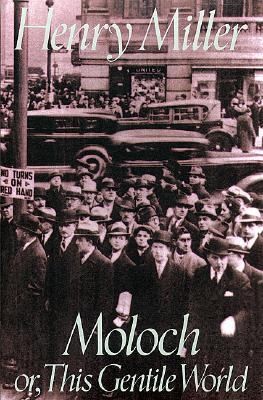Rupert Owen reviewed Moloch Or This Gentile World by H. Miller
Review of 'Moloch Or This Gentile World' on 'GoodReads'
3 stars
I imagine it is quite a challenge to write a despicable and deplorable character in the third person when inspiration is drawn from the first person. Moloch Dion isn’t without redeeming or hopeful aspects to his nature, I wouldn’t say he’s complex but he is certainly contradictory and nuanced like any well rounded human being. The problem with looking at this book through any kind of presupposed lens is like never having done something appalling compared to having done something appalling and being either ashamed or enlightened by it. The former will get you nowhere with this book, the latter will allow empathy and objectiveness to guide you through the narrative. I’m a stickler for the idea that writing allows expressive freedom that would otherwise be reprimanded in “real life”. I don’t think literature ought to be a parable and I don’t think it needs to apply a Disney moral clause to its arc. Bastards can be victorious, nastiness and excesses in human nature can be exploited, and decorum done away with ... on the page (without apologies, annotations, or parenthesis necessarily needed, implied or otherwise).
Moloch, or This Gentile World slums the reader through a rambling vignette, a “turquoise gigue of thought”, in a particular place at a particular time of life inhabited by Dion Moloch, recruitment chief for the American Telegraph Company. By all accounts, Dion is a xenophobe and chauvinist, much so, mostly in sentiment. He contradicts this, at times, by proving otherwise through his actions and sometimes his thoughts. There is a conflict of interest between Dion’s friends and Dion’s bigotry. Through him, the reader can see society is struggling with its own sense of righteousness with its diverse multicultural and spiritual mix. This is apparent to me because of the last few chapters. Dion is analogous to the society he belongs to, “This soul of his suddenly began to take on apostolic dimensions. It required attention, like a plant.” At the beginning of Chapter Fifteen, Miller abruptly breaks the convention of his narrative by introducing the first person authorial voice of “we and our” and then finally caps it off by speaking directly with the reader with the second person “you”. He's telling us the story of Dion Moloch, undoubtedly, with a peppering of himself and perhaps allowing for a bit of closeted personal dogmatism to have free range on the page.
Dion is forever chasing the next stimulant while painfully trying to resolve within himself a turbulent and suggestively violent relationship, and at the same time propping his hopes, against a backdrop of literary influences, in becoming a writer. This is the blatant authorial voice coming through the character. To be honest, for me it didn’t quite fit Dion’s landscape and lifestyle. I felt Henry used it a bit too much as a beacon of redemption for Moloch. I’ve always found this with Miller’s writing and, to a great degree, it is what partly makes the reading experience so alive. Another addition to these kind of ballooned narrative devices he inflates when needed is the inclusion of a child who seems to come and go whenever the story calls for it. There were times when I thought, where is the child?
I don’t know how faithfully Miller would have channeled his own relationship into this novel, considering June was supposed to be "author" as far as the publisher was concerned. I imagine she would have read the chapters as they were written before handing them over. I’m sure there were a few digs here and there. The best way for me to sum up the character of Blanche is through one of Miller’s sentences. “Blanche slipped off quietly to clasp her dreams.” There’s really not much more to say than that. Her pains and dilemmas belong in another story. Their explosive relationship is not unlike any other relationship that has become ground down and teetering on the edge of separation. What makes it different from a narrative point of view is that we don’t experience much of them confronting their issues together until the very end. Everything is circumstantial. It isn’t until the end that Moloch reviews his behaviour privately and the relationship takes centre stage. Throughout the novel, we view the abhorrence of the relationship as expressed by Moloch’s friends when they witness it personally or are confided in by Dion. There were many lead-ups in this book but only one claimed the ending.
I enjoyed the casualness of this work. I was satisfied it lacked the raunch of his other prominent works that were to grow from this book. The reason for this is because I found the language he employs to be invigorating. As an aside, there are quite a few spelling mistakes and grammatical errors. Not off-putting, but interesting from a writers point of view when considering substance over syntax from an established literary author.
There is one chapter that breaks from the book’s typical vernacular. At one point Dion has a dream where he finds himself equipped with a bow and arrows in a feudal landscape replete with a medieval castle. Miller briefly casts open a fantasy world that would prove him, had he applied himself to that genre, a very capable fantasy writer. “Here nothing of plant or vegetable life could be seen. Petrified limbs of gigantic proportions, carbuncled with glistening mineral crustations (sic), sprawled supinely in this brackish void.”
All in all I found, "It was a funambulesque exhibition sans parasol."

